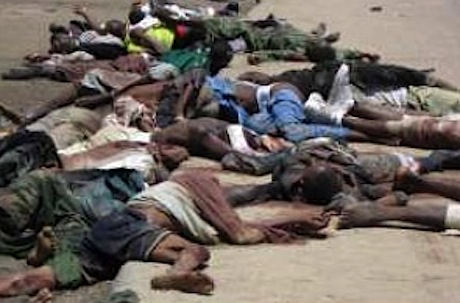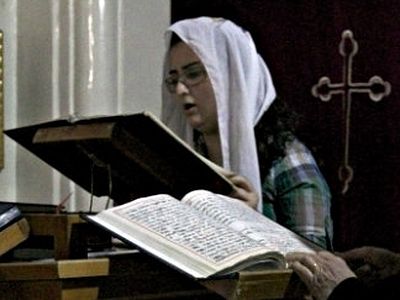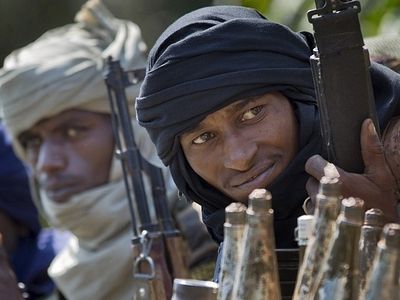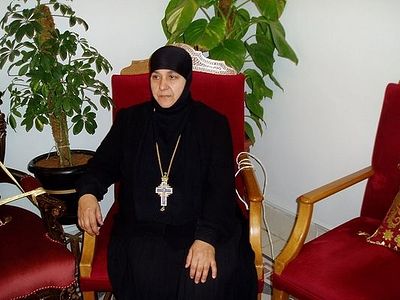SOURCE: The Telegraph
By Alan Johnson
 Christians killed in Jos, Nigeria
Christians killed in Jos, Nigeria
"One hundred thousand Christians will be massacred this year because of their beliefs." Last Tuesday, with these words, Jim Shannon MP (DUP) began a Commons debate on the unfashionable crime against humanity.
The two-hour Commons debate that followed was revealing for three reasons. First, for the near-total absence from the chamber of the Labour Party, a party founded by a Christian, Keir Hardie. Second for the failure of Alan Duncan’s DfID to turn up at all. Third, for the insight it provided into the intellectual failure of the Government.
Called upon to respond to the debate for the Government, Mark Simmonds, the parliamentary under-secretary of state for Foreign and Commonwealth Affairs, decided that this would be his first point: “it is not just Christians who are suffering such persecution”. (Can you imagine this being the Government’s response to a debate about the persecution of any other group?)
An angry Sir Edward Leigh (there were a lot of angry backbenchers on Tuesday) intervened: "The overwhelming number of persecutions in the world today are against Christians." Doggedly, Mr Simmonds stuck to his brief: "Yes… but there are others who are suffering as well." He made this universalise-to-minimise argument again and again. And he drew out its political logic: "our response to the persecution of Christians should not be sectarian. We should not be standing up for … Christians in particular, we should be supporting the right to freedom of religion. (emphasis added)’
Simmonds's argument flies in the face of everything we know about how oppressions actually get defeated. Nowhere, at any time, has an oppression been defeated without a laser-like focus on these three things: empowering the victims by organising them and resourcing them, making them agents; targetting the perpetrators – making them pay a heavy practical price for their actions, while undermining the spurious arguments they use to justify themselves; forcing the rest of us, the bystanders, to take a stand. This was how votes for women were secured in the early 20th century, civil rights for African-Americans in mid-century and gay and lesbian equality in its closing decades.
When Martin Luther King was thrown in jail in Birmingham, Alabama, for protesting against racism against blacks, he was reproached from some fretful clergy: wait, stop pushing so hard, stop being "sectarian". In response King wrote them a famous letter, pointing out that said that nothing but direct action, moral passion and the "fierce urgency of now" would do. The member of the government who seems to get the need for the fierce urgency of now is Baroness Warsi, a Muslim. Speaking in Georgetown in November, she said: “A mass exodus is taking place on a biblical scale – [there is a] real danger Christianity will become extinct”. She raged against the “discrimination, ostracism, torture, even murder” that Christians suffer, “simple for the faith they follow.”
Compare her passion to pitiful list of actions Mr Simmonds recited in the Commons: at the Commonwealth Heads of Government meeting “freedom of religion and belief was discussed”; the Foreign Secretary is “setting up an advisory group”; in Kuala Lumpur the high commission “raises the issue”; “along with our European partners, [the UK] sponsors a resolution at the UN twice every year” (twice! every year!). And when it comes to the government of Nigeria, where Christians in the Sharia state North are more or less finished off, the UK government has… “consistently encouraged” respect for human rights. And so on.
Back benchers from all sides of the house demanded more and tougher actions. But their critique of both front benches was also intellectual. As one MP said: “Any other overseas problem on this scale would have been a priority for the Foreign Office, yet the Minister and the Opposition Front bench spokesman attempted to widen this topic, rather than to zone in on the real issue which is this is a particular group which is being persecuted.”
Exactly.
But the problem lies not just with our political leaders. We voters are no better. The historians will say of our response to this slow-motion crime against humanity that for all our talk of "never again", we once again played the part of bystanders. And they will add this. We didn’t notice, so busy were we playing an elaborate parlour game called "the God debate". While Churches were burned and their worshippers were slaughtered, the historians will record that we spent our time at book festivals cheering on Christopher and Richard and Sam as they… stuck it to the Christians and their imaginary friend.



